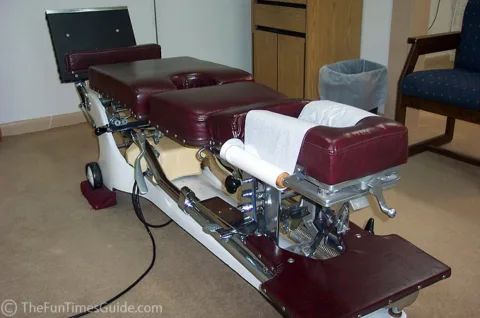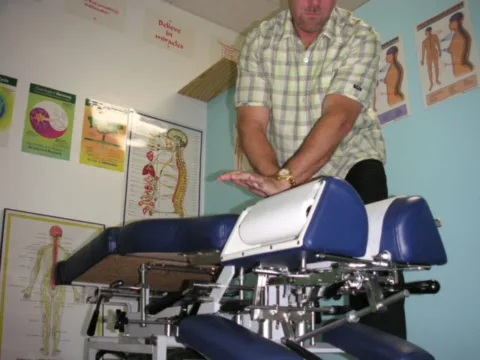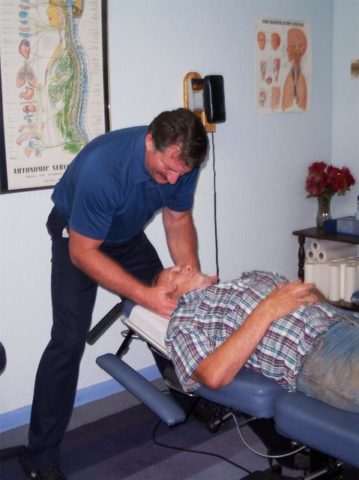As I’ve written here before, I go to a chiropractor regularly. It started as a treatment for carpal tunnel and neck pain.
After monthly visits over the course of 7 months or so, I tried weaning myself off of chiropractor visits. However, largely due to the fact that I spend upwards of 13 hours a day at a computer, the pain managed to creep back into my neck and shoulders again.
So now I go in for a chiropractic adjustment “as needed” — which is about every other month.
A Chiropractor Can Cure Whatever Ails You
There are certainly a number of benefits to having a chiropractor put your body back in alignment through a series of adjustments called spinal manipulations.
However, there’s also a serious warning about neck adjustments that I just learned about.
Before you visit a chiropractor to alleviate neck pain, following is some important advice before letting a chiropractor crack your neck, plus info about the risks associated with chiropractic neck adjustments.
See what Dr. Oz thinks about chiropractors cracking the joints in peoples’ bodies — especially the neck!
Yes, Crack My Neck… Please!
My favorite “adjustment” up until now has been what I refer to as “the neck crack” or “that one that twists your neck.”
Though slightly nervous before I had it done the first time (in fact, I was highly skeptical of the entire chiropractic field initially), I’ve actually begged my chiropractor for that particular adjustment on numerous occasions since.
My chiropractor won’t do it all the time though. If he’s not sensing any tension in the areas which that neck adjustment would relieve, then (much to my regret) he opts for another type of adjustment instead.

“How Can You Do That?!…”
That’s what everyone says when I tell them how great my neck feels after having a neck adjustment.
Fortunately, the very first time that this forceful neck adjustment was done on me, I had little or no warning beforehand. Had he prepped me for it in advance, I probably would’ve tightened up and been quite nervous.
In fact, I don’t actually recall, but I might have advised him on that first visit: “If you’re going to do that neck-twist thing, I don’t want to know about it ahead of time… just do it.”
I know that was my intention anyway — because I so desperately needed relief. And up to that point, I had tried everything else under the sun.
So, I was mentally ready to try the neck adjustment. (In fact, that’s all I thought chiropractors did at the time.) And I just didn’t want to be given an opportunity to back out.
To this day, I still ask, “Can I have a neck adjustment please?” To which he always says, “I’ll see if you need one first.” And my standard reply is: “If you’re going to do it, don’t tell me about it ahead of time — just go ahead and to it.” (That way I won’t tense up.)
I think that anyone who worries about this particular type of chiropractic adjustment for the sole purpose of fearing the unknown itself should just lighten up and relax. Enjoy the relief you get afterward! I say that as someone who’s been there, done that.
The best part is — it literally happens in a millisecond!
Plus, you’ll feel refreshed when it’s done — like you have full-range of motion in your neck again. It honestly does make my neck pain and the stress in my shoulders feel better.
But Wait, There’s More!
That said, I have a chiropractic visit scheduled for tomorrow, and I have to admit I’m feeling some slight reservation to getting the “neck twist” done this time.
Why? Because I was reading through an old issue of Consumer Reports, and I find this:
A University of California, San Francisco, study of stroke victims published in 2003 found that chiropractic manipulation of the neck significantly increased the risk of stroke by causing the lining of a neck artery to break off and block blood flow to the brain. Other studies have echoed that concern. Source
Woah!… I’ve always trusted and respected whatever Consumer Reports has to say, but now it’s hitting really close to home. Whether or not I choose to heed their warning could ultimately affect whether I live or die.
Okay, maybe that’s a bit exaggerated. But I bet Lana Dale Lewis’ family doesn’t think so. You see, she’s a lady who died after experiencing 2 strokes immediately after receiving a chiropractic neck adjustment. It was ruled an accident.
Here’s a 50-minute video highlighting some of those who died after visiting a chiropractor (including Lana Dale Lewis). This video also shows the controversial neck adjustment being done several times:
In reality, there have been a number of patients who have suffered a stroke — either in the chiropractor’s office or days later. Some have even died.
I found a story about Katie May, a model, who died after the chiropractic procedure (neck manipulation).
After her story came out, I found this:
It’s very rare that the vertebral arteries would have a potential tear — very rare. Your vertebral arteries are major arteries of the neck that supply blood to the upper part of your body. Research from the American Chiropractic Association shows chances of tearing one happens only once in every 5.85 million adjustments! Source
So, while it could happen, I think the odds of this happening to me or someone I know are incredibly slim.
And to put that number in perspective, here are some other similar odds:
- Dying from a bee sting: 1 in 6 million
- Being struck and killed by lightning: 1 in 5.5 million
- Going blind after laser eye surgery: 1 in 5 million
- Winning the big grand prize in the lottery: 1 in 5 million
Chiropractic Neck Adjustments Remain Controversial
Adding fuel to the fire…
- Here’s a collection of news reports and studies warning of the dangers associated with neck adjustments.
- And, here’s a report on what they’re calling Chiropractic’s Dirty Secret: Neck Manipulation and Strokes.
- Preston Long, Ph.D., a Diplomat of the American Board of Forensic Examiners who acts as their chief liaison officer to the state of Arizona points out all the ways that stroke and spinal manipulation go hand in hand.
The preponderance of the scientific literature supports a direct cause-and-effect mechanism between spinal manipulation and stroke. The therapeutic benefit of spinal manipulation in acute neck pain remains unproven. Source

All of that said, chiropractic treatment itself is safe. Neck manipulation is just one aspect of chiropractic care — and it’s entirely optional.
Incidence of stroke from all causes is only 10 per 100,000 — so we’re not talking about large numbers of victims. But rare incidents do happen, and physicians and patients should be aware of spinal manipulation therapy as a rare but potentially causal factor in stroke. Source
Here’s a good summary of the risk vs. benefit of chiropractic neck manipulation.
Will I Continue To Get Neck Adjustments?
I probably will continue getting my neck cracked (my term, not theirs) by a chiropractor.
Here’s why:
- I take comfort in knowing that chiropractors are licensed in all states.
- Chiropractors must receive constant training throughout their career and stay abreast of all the latest news and studies.
- They know the rules. Why would any well-intentioned chiropractor want to risk a malpractice suit unless he truly felt that his actions were helping his patients?
- If I have come to trust a particular chiropractor on other issues as they pertain to my health and well-being, then I will trust him on this as well.
- It makes my neck pain and shoulder tension feel much better afterwards.
- There are risks to everything in life. It’s far riskier for me to drive to the chiropractor than it is to have my neck cracked by one!
UPDATE: My Chiropractor’s Opinion About Neck Manipulation
Okay, so I had to go back the chiropractor recently, and I started the appointment by asking for his take on this whole issue of the risks associated with neck manipulation.
He is very knowledgeable about it, and offered this interesting comparison:
“It’s 8 times riskier getting your hair washed at the beauty shop (…where you’re leaning back awkwardly with your neck over that scooped-out portion of the sink).”
He also said that there are other ways to achieve the same thing at a chiropractor’s office — if you have tension or misalignment in your neck area.
For example, he said “the drops” are just as effective as “the twist”.
“The drops” are where you’re lying on your stomach, and as the chiropractor applies a certain amount of quick and forceful pressure to a key area of your neck, the headrest gives way (ever so slightly).

I don’t mind “the drops” at all, but it just doesn’t seem as effective to me — simply because I don’t feel the “wow” factor. In fact, the “forceful pressure” is hardly even noticed at all.
By the way… my mom went to a chiropractor (for migraines). She refused to let them do the neck adjustment on her. Instead, her chiropractor performed something like 150 tiny taps in succession at the nape of her neck — which he said would serve the same purpose. I don’t get it, but she said it worked just fine.
So, in light of our conversation, the chiropractor asked for my preference should any neck adjustment be necessary after his initial examination today.
I said I really wanted the neck twist, because I always feel much better immediately afterward. But, like usual, I just didn’t want to know ahead of time that it was coming (because I feel like I’m more likely to tense up a bit, rather than remain completely relaxed). I love it, and I don’t fear it — but there’s something about the “neck twist” that gets the endorphins charged in your brain right before it happens.
He thought since I usually have the “twist” done (again, my word not his), he’d do the “drops” for a change — just so I’d have something to compare it to. The verdict: I’m going back to the twist — it’s more immediate and feels like it’s really working. My neck pain is alleviated both ways, but the twist just feels so much better to my entire body, and it seems like the neck pain stays away longer.
So, I’m sticking with my initial feelings on this matter.
Everything in life is risky — this is just another of those things. In reality, the amount of risk here is negligible, compared to so many other things we do on a daily basis. That’s just my $.02.
Other Interesting Things About Chiropractic Care
I like to think that I’m open-minded. And I definitely respect both sides of the story on this matter. I like to share information from both sides, so you can make your own decision about what’s best for you:
- Quick Tricks To Alleviate Neck Pain
- 5 Reasons To Visit A Chiropractor After A Car Accident
- Why Not Everyone With Low Back Pain Chooses Chiropractic Care
- 10 Reasons You Should Consider Chiropractic Therapy
- Online Videos Of Neck Stretches To Relieve Neck Pain
- 10 Reasons You Should Never Miss Your Chiropractic Appointments





